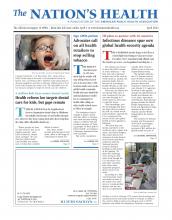Nearly one-third of young and middle-age adult stroke survivors struggle to live independently without some type of assistance 10 years later, according to a recent study.
The study, published online Feb. 27 in Stroke, found that 10 years after the first stroke, 32 percent of young and middle-aged stroke victims lived with some disability preventing them from living fully independently, according to study author Frank-Erik de Leeuw, PhD, associate professor of neurology at Radboud University Nijmegen Medical Center in the Netherlands.
A stroke — caused by either a burst blood vessel inside the brain or a clot that blocks blood flow to the brain — can impair skills such as speech and movement, according to the Centers for Disease Control and Prevention. The study looked at more than 700 people admitted to the medical center who first had a stroke between ages 18 and 50 between January 1980 and November 2010.
Annually, about 795,000 people in the U.S. suffer strokes, which kill 130,000 Americans each year, according to CDC. Worldwide, 31 percent of strokes occurred in children and young and middle-aged adults between 1990 and 2010, according to a study published in the January edition of The Lancet. Adults ages 20-74 from low- and middle-income countries made up 78 percent of those strokes.
“We feel this study is important because it reveals for the first time the very long-term functional perspective of patients who suffered a stroke at a relatively young age,” de Leeuw told The Nation’s Health. “The traditional view is that the course after the disease is rather favorable. However, we showed that this is not the case.”
The study further broke down the level of disability by the type of stroke.
One out of eight people who suffered a hemorrhagic stroke — caused by bleeding in the brain — or an ischemic stroke — caused by a blood clot in the brain — struggled with independent living, the study said.
Young hemorrhagic stroke victims had the highest chance of long-term disability. Nearly half of those survivors lived with a functional disability and 18.2 percent were unable to live independently, the study said.
Some of the biggest risks for stroke include smoking, high cholesterol and high blood pressure, according to CDC. Other risk factors include age, race, ethnicity, gender and genetic history.
Regular exercise, limiting alcohol, eating a healthy diet and abstaining from smoking are ways to lessen the likelihood of stroke, according to CDC. People can reduce risk of stroke with these preventive measures, while those who have suffered a stroke may benefit by “setting up interaction with doctors who are involved in rehab and reintegration to work,” de Leeuw said.
For more information, visit https://stroke.ahajournals.org/content/early/2014/02/27/STROKEAHA.113.004411.abstract.
- Copyright The Nation’s Health, American Public Health Association









